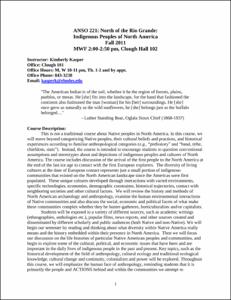Please use this identifier to cite or link to this item:
http://hdl.handle.net/10267/14771Full metadata record
| DC Field | Value | Language |
|---|---|---|
| dc.contributor.author | Kasper, Kimberly | - |
| dc.date.accessioned | 2013-01-10T15:51:14Z | - |
| dc.date.available | 2013-01-10T15:51:14Z | - |
| dc.date.issued | 2011-08 | - |
| dc.identifier.uri | http://hdl.handle.net/10267/14771 | - |
| dc.description | This syllabus was submitted to the Rhodes College Office of Academic Affairs by the course instructor. | en_US |
| dc.description.abstract | Course Description: This is not a traditional course about Native peoples in North America. In this course, we will move beyond categorizing Native peoples, their cultural beliefs and practices, and historical experiences according to familiar anthropological categories (e.g., “prehistory” and “band, tribe, chiefdom, state”). Instead, the course is intended to encourage students to question conventional assumptions and stereotypes about and depictions of indigenous peoples and cultures of North America. The course includes discussion of the arrival of the first people to the North America at the end of the last ice age to contact with the first European explorers. The diversity of living cultures at the time of European contact represents just a small portion of indigenous communities that existed on the North American landscape since the Americas were first populated. These unique cultures developed through interactions with varied environments, specific technologies, economies, demographic constraints, historical trajectories, contact with neighboring societies and other cultural factors. We will review the history and methods of North American archaeology and anthropology, examine the human environmental interactions of Native communities and also discuss the social, economic and political facets of what make these communities complex whether they be hunter-gatherers, horticulturalists and/or capitalists. Students will be exposed to a variety of different sources, such as academic writings (ethnographies, anthologies etc.), popular films, news reports, and other sources created and disseminated by different scholarly and public audiences (both Native and non-Native). We will begin our semester by reading and thinking about what diversity within Native America really means and the history embedded within their presence in North America. Then we will focus our discussion on the life histories of particular Native American peoples and communities, and begin to explore some of the cultural, political, and economic issues that have been and are important in the daily lives of indigenous people in the past and present. Key topics, such as the historical development of the field of anthropology, cultural ecology and traditional ecological knowledge, cultural change and continuity, colonialism and power will be explored. Throughout this course, we will emphasize the human face of anthropology, reminding students that it is primarily the people and ACTIONS behind and within the communities we attempt to 2 understand! This course fulfills the F9 requirement: View the world from more than one cultural perspective. | en_US |
| dc.language.iso | en_US | en_US |
| dc.publisher | Memphis, Tenn. : Rhodes College | - |
| dc.relation.ispartofseries | Syllabi CRN;12103 | en_US |
| dc.rights | Rhodes College owns the rights to the archival digital images in this repository. Images are made available for educational use only and may not be used for any non-educational or commercial purpose. Approved educational uses include private research and scholarship, teaching, and student projects. For additional information please contact archives@rhodes.edu. Fees may apply. | - |
| dc.subject | Anthropology and Sociology, Department of | en_US |
| dc.subject | Syllabus | en_US |
| dc.subject | Curriculum | en_US |
| dc.subject | Academic departments | en_US |
| dc.subject | Text | en_US |
| dc.subject | 2011 Fall | en_US |
| dc.title | ANSO 221-01,North of the Rio Grande: Indigenous Peoples of North America, Fall 2011 | en_US |
| dc.type | Syllabus | en_US |
| Appears in Collections: | Course Syllabi | |
Files in This Item:
| File | Description | Size | Format | |
|---|---|---|---|---|
| 2011_fall_ANSO_221-01.pdf | 223.02 kB | Adobe PDF |  View/Open |
Items in DSpace are protected by copyright, with all rights reserved, unless otherwise indicated.